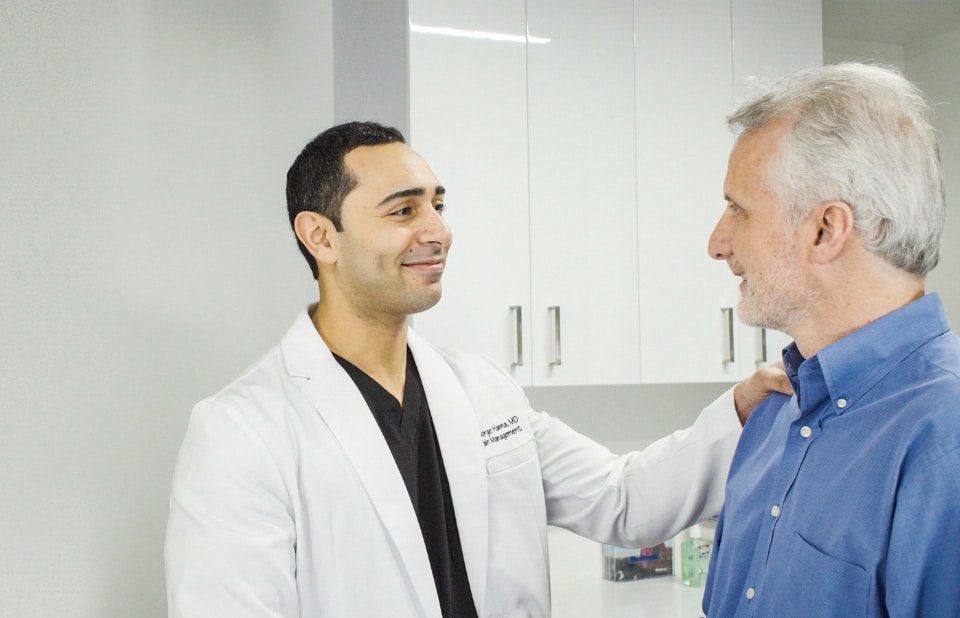What Doctor Treats Osteoarthritis? Top FAQs About Knee Pain Doctors in New York
What doctor treats osteoarthritis?
If you have joint pain, knee or hip pain, or the signs and symptoms of osteoarthritis, you may wonder, “what doctor treats osteoarthritis?” You may also wonder what an arthritis specialist is called or which doctor you should consult for joint pain. Should you contact an orthopedist, rheumatologist, primary care doctor, pain treatment specialist, or someone else? Numerous doctors are qualified to diagnose and treat osteoarthritis and its symptoms.
Knee Pain Doctor is a state-of-the-art medical center specializing in the diagnosis and treatment of joint pain and osteoarthritis in New York City. Our medical center is led by board-certified interventional pain specialists who diagnose and treat the root cause of knee or hip pain, not just the symptoms. We only provide conservative or minimally invasive treatments to alleviate joint pain without relying on surgical intervention or opioids.
You can find our knee pain doctors at 290 Madison in Midtown Manhattan, a short walk from the Empire State Building and the Chrysler Building. We also have a state-of-the-art pain treatment center in the Financial District, a short walk from the 9/11 Tribute Museum and the New York Stock Exchange. Depending on your location, please schedule an appointment with your nearest knee pain doctor in New York City.
Below, we describe the types of doctors who diagnose and treat osteoarthritis.
Primary Care Doctor
Primary care doctors manage the symptoms of osteoarthritis with standard solutions, such as non-steroidal anti-inflammatory medications and physical therapy referrals. They administer x-rays to examine the internal structure of your bones, following which they determine if you have severe joint problems besides osteoarthritis. If you need more intense management, the primary care doctor may refer you to other rheumatologists, orthopedic doctors, or pain specialists.
Orthopedists
Orthopedists are medical doctors specializing in the diagnosis and treatment of medical conditions related to the musculoskeletal system, such as osteoarthritis and rheumatoid arthritis. They may offer corticosteroids, hyaluronic acid injections, or other minimally invasive procedures for joint pain. If you have severe osteoarthritis with joint problems, they may also recommend surgical procedures, such as knee or hip joint replacement.

Sick of your Knee Pain?
Book an Appointment!
We offer free insurance verification! Fill out the form and expect a call from one of our agents:
Rheumatologists
Rheumatologists are medical doctors specializing in the diagnosis and treatment of medical conditions related to the musculoskeletal system and the immune system, such as rheumatoid arthritis. They treat all types of arthritic conditions, but they primarily focus on rheumatoid arthritis, which leads to joint problems because of autoimmune conditions. Primary care doctors refer patients to rheumatologists if there’s a chance they may have rheumatoid arthritis.
Interventional Pain Specialists
Interventional pain specialists are medical professionals with specialized training in the diagnosis and treatment of the root cause of joint pain, hip or knee pain, and arthritic conditions. They administer x-rays, MRI scans, and blood tests to diagnose the root cause of joint pain, following which they curate a personalized treatment plan, usually consisting of minimally invasive procedures, such as corticosteroid injections.
What are the 4 stages of osteoarthritis?
Osteoarthritis is a medical condition that affects the cartilage between the bones, leading to joint pain, knee or hip pain, and painful symptoms in other parts of the body. Osteoarthritis makes the cartilage break down, leading to increased swelling, pain, inflammation, and the loss of mobility. This is a progressive condition that gradually worsens with time. Your personalized treatment plan will be designed according to the stage of osteoarthritis.
The following are the stages of osteoarthritis:
- Stage 0 (Pre-Osteoarthritis): You have normal, healthy joints without any symptoms. But joint damage may have started on a cellular level, which can lead to osteoarthritis.
- Stage 1 (Early/ Doubtful): You might lose some of the cartilage tissues between your joints and develop some bone spurs, but the space between the fonts doesn’t reduce.
- Stage 2 (Mild/ Minimal): The cartilage between your joints may start breaking down considerably, which reduces the space between your joints and causes bone spurs.
- Stage 3 (Moderate): The cartilage between your joints shows clear signs of wear, and the space between your joints becomes narrow, leading to joint pain and the loss of mobility.
- Stage 4 (Severe): The cartilage is severely damaged or completely lost, the bone spurs are large, and the joints don’t have enough synovial fluid for smooth movements.

Find Your Nearest Knee Pain Treatment Center
Our Manhattan NY knee pain clinic is conveniently located on 290 Madison Avenue Suite 203
When should you see a rheumatologist for osteoarthritis?
You should consult a rheumatologist or interventional pain specialist if you have persistent symptoms of joint pain or knee and hip pain, especially if the symptoms worsen with time. If you don’t seek treatment, the symptoms of osteoarthritis will continue worsening, and you’ll eventually develop severe osteoarthritis, which is nearly impossible to reverse. That’s why you should consult an interventional pain specialist or a rheumatologist as soon as you notice the early signs and symptoms of osteoarthritis.
The following are the symptoms of osteoarthritis:
- Persistent pain in the affected joints
- Joint stiffness
- Tenderness in your joints
- Loss of mobility
- Loss of flexibility
- Grating sensations when you move
- Popping or clicking sounds
- Hard lumps around the joints (bone spurs)
- Inflammation and swelling
What causes osteoarthritis to flare up?
Different people have different osteoarthritis flare triggers. But some of the most common triggers for osteoarthritis flare-ups include repetitive movements, infections, weight gains, stress, bone spurs, changes in barometric pressure, and cold weather.
How do you stop osteoarthritis from progressing?
You can slow down the progression of osteoarthritis by following these tips:
- Lose weight to reduce pressure on weight-bearing joints, such as the knees and hips
- Control your blood sugar levels
- Engage in at least 30 minutes of moderately intense exercises five times a week
- Protect your joints from injuries while working and engaging in other activities
FEATURED POSTS BY PAIN DOCTORS
Find a Doctor for Knee Pain at Brighton Beach, NY
Find a Doctor for Knee Pain at Brighton Beach, NYKnee pain can make even the simplest tasks feel like monumental challenges. Whether it’s the sharp pain you feel when climbing stairs, the nagging discomfort after walking for a while, or the stiffness that sets in...
Find the Best Knee Pain Doctor in Brighton Beach, NY
Find the Best Knee Pain Doctor in Brighton Beach, NYKnee pain can be a daily struggle that affects everything from your morning jog to simply walking up the stairs. If you’ve been experiencing knee discomfort, stiffness, or swelling, you know how it can limit your...
Knee Pain Treatment: What to Expect and What to Avoid
Knee Pain Treatment: What to Expect and What to AvoidIf you're reading this article, chances are you or someone you know is experiencing knee pain, and you're seeking answers on how to effectively manage and treat it. At New York Knee Pain Doctor, led by...
The Benefits of Knee Pain Treatment for Athletes
The Benefits of Knee Pain Treatment for AthletesAre you an athlete struggling with knee pain, desperately searching for relief and a way to get back to your peak performance? At New York Knee Pain Doctor, we understand the unique challenges athletes face when dealing...
Meet Our Team of Knee Pain Specialists
KNOW OUR TEAM OF HARVARD TRAINED KNEE SPECIALISTS

Knee Pain Doctor in New York
Dr. Michael Nguyen
Dr. Michael is available for Knee Pain treatment consultations in Manhattan, New York.

Knee Pain Doctor in New Jersey
Dr. George Hanna
Dr. Hanna is available for Knee Pain treatment consultations in Manhattan, New York.

Knee Pain Doctor in New York
Dr. Shane Volney
Dr. Volney is available for Knee Pain treatment consultations in Manhattan, New York.
Keeping you safe during COVID-19
Learn about our health & safety protocol.







contact us today
Call us
Speak instantly with one of our team members; they will answer any questions you may have regarding insurance coverage, booking an appointment and our knee pain center in New York and New Jersey.
Book Online
Visit our Book Appointment page and instantly request an appointment at our Manhattan knee pain clinic. We offer Free Insurance Verification before your appointment.
Get directions
Learn how to easily get to the Knee Pain Clinic nearest you.




